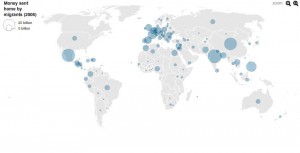Remittances sustaining communities in the developing world

Money sent home by migrants (2006)
Migrants from developing countries sent an estimated $US414 billion to their families last year – triple the total of official international development assistance.
More than a billion people rely on such funds to help pay for education, health care, water and sanitation.
United Nations planners have finally realised the importance of these numbers and migration and remittances will feature prominently in the UN’s post 2015 development goals.
Remittances have important macroeconomic benefits too, enabling countries to pay for essential imports, access private capital markets and qualify for lower interest rates on sovereign debt.
But many of the social and economic benefits of migration are squandered. Financial intermediaries extract around nine per cent of remittances, on average, reaping an estimated total of $49 billion from migrant earnings last year.
Unscrupulous recruiters or employers, who sometimes keep one-third of a migrant’s pay, skim billions more. While, smuggling, trafficking, exploitation and discrimination take a further incalculable human toll.
A group of countries, international agencies and NGOs has made a strong case to the UN Open Working Group on Sustainable Development Goals (the body responsible for facilitating deliberations on the post-2015 development agenda) that migration can help reduce poverty and generate economic growth.
The group’s proposal – which includes lower remittance costs, increased pension portability and strong action against human trafficking – calls for a specific set of targets and indicators, which would substantially enrich the next development agenda.
It calls for migrants to be considered when measuring progress toward other goals, such as ensuring decent work and equitable access to healthcare services.
There is a groundswell of political support behind this effort. Last October, when the UN General Assembly met to discuss migration for only the second time, member states unanimously approved a declaration that called for migration’s inclusion in the post-2015 agenda.
Experts say that migration – when it is safe, legal, and voluntary – is the oldest poverty-reduction and human-development strategy known to man.
A measure of the size and importance of migration to global social stability has been the resurgence of the US-based company Western Union.
The rise of digital technology saw the company file for bankruptcy in 1992.
But it has staged a remarkable comeback thanks to international money transfers.
With five times as many locations worldwide as McDonalds, Starbucks, Burger King and Wal-Mart combined; Western Union is the lone behemoth among hundreds of money transfer companies.
Western Union’s dominance of the industry casts it in a host of unlikely new roles: as a force in development economics, a player in US and international immigration debates and a target of contrasting attacks.
“Global migration is the cornerstone of how we’ve grown,” says Christina Gold, Western Union’s Chief Executive.
Its unparalleled reach gives millions of migrants a safe way to transmit money, and may even increase the amounts sent.
But critics have long complained about its fees, which can run from about 4 per cent to 20 per cent or more.
And the company’s lobbying for immigrant-friendly laws has raised the ire of people who say it profits from, or even promotes, illegal immigration.
After settling a damaging lawsuit that accused it of hiding large fees, Western Union set out a few years ago to recast its image, portraying itself as the migrants’ trusted friend.
It has spent more than $US1 billion on marketing over the past four years, selectively cut prices and entered US politics, donating to immigrants’ rights groups and advocating a path to legalization for illegal immigrants.
While some migrant groups still complain of predatory pricing, the company is beginning to win praise.
“Western Union has become a company that values and protects its customers,” said Matthew Piers, the Chicago lawyer who originally sued the company over its fees.












